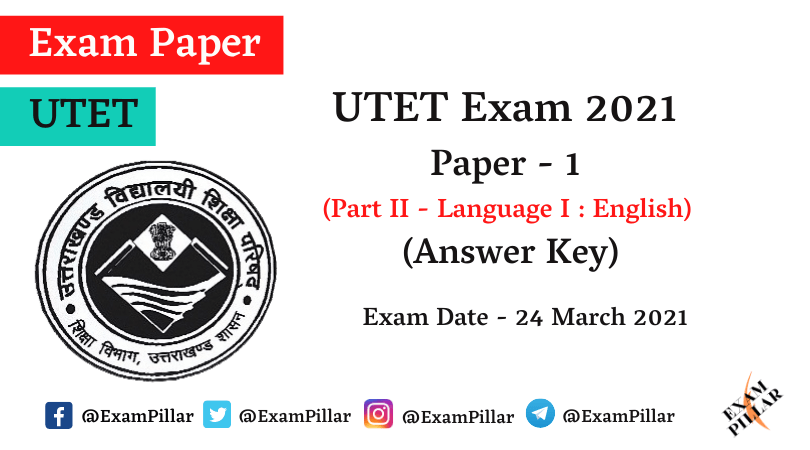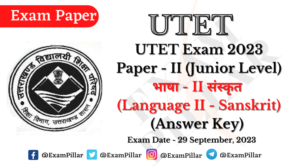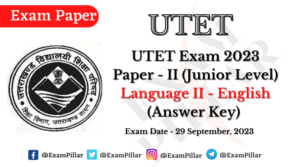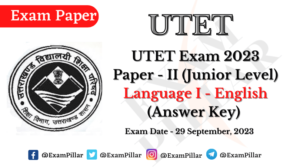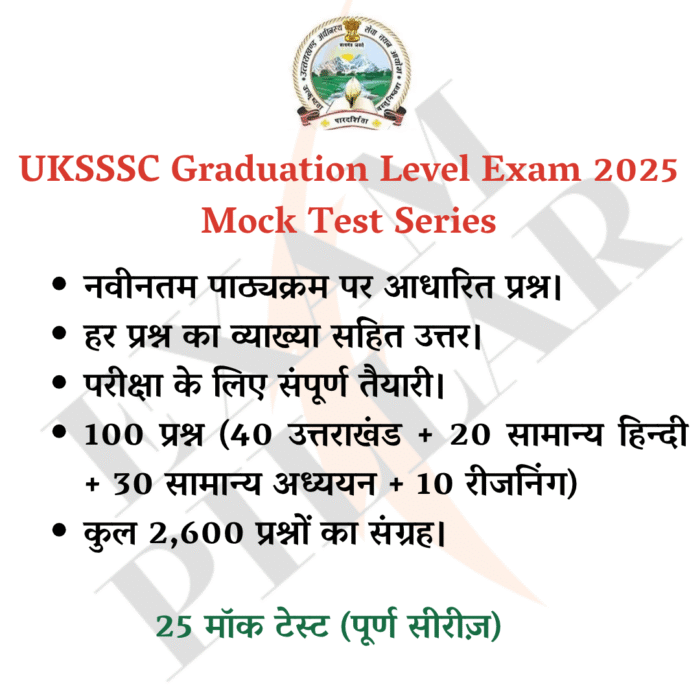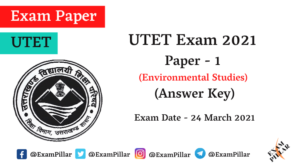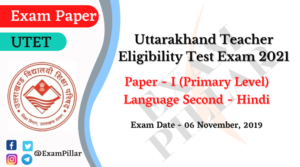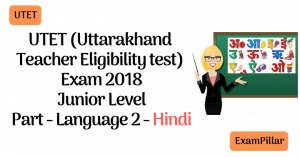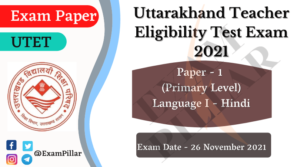उत्तराखंड विद्यालयी शिक्षा परिषद् (UBSE – Uttarakhand Board of School Education) द्वारा 24 मार्च 2021 को UTET (Uttarakhand Teachers Eligibility Test) की परीक्षा का आयोजन किया गया। UTET (Uttarakhand Teachers Eligibility Test) Exam 2021 Paper 1 – भाषा – I : अंग्रेजी की उत्तरकुंजी (Language I : English) यहाँ पर उपलब्ध है।
UBSE (Uttarakhand Board of School Education) Conduct the UTET (Uttarakhand Teachers Eligibility Test) 2021 Exam held on 24 March 2021. Here UTET Paper 1 Language I : English Subject Paper with Official Answer Key.
UTET (Uttarakhand Teachers Eligibility Test) Primary Level
(Class 1 to Class 5)
Exam :− UTET (Uttarakhand Teachers Eligibility Test)
Part :− भाषा – I : अंग्रेजी (Language I : English)
Organized by :− UBSE
Number of Question :− 30
Exam Date :– 24th March 2021
| UTET Primary Level Paper | Link |
| UTET Exam 2021 – Paper – 1 (Child Development and Pedagogy) | Click Here |
| UTET Exam 2021 – Paper – 1 (Language – I : Hindi) | Click Here |
| UTET Exam 2021 – Paper – 1 (Language – II : Hindi) | Click Here |
| UTET Exam 2021 – Paper – 1 (Language – I : English) | Click Here |
| UTET Exam 2021 – Paper – 1 (Language – II : English) | Click Here |
| UTET Exam 2021 – Paper – 1 (Environmental Studies) | Click Here |
UTET Exam 2021 Paper – 1 (Primary Level)
भाग – II – भाषा – I : अंग्रेजी
(Part – II – Language – I : English)
Direction (Q. No. 31). Select the most appropriate word to fill in the blanks in the given sentence the plan
31. It would be unwise to ______ at this stage.
(A) grasp
(B) abandon
(C) craggy
(D) clutch
Show Answer/Hide
Direction (Q. No. 32-33): In the following questions select the most suitable option for indirect narration.
32. I said to him, “Why are you working so hard?”
(A) I asked him why he was working so hard.
(B) I asked him why was he working so hard.
(C) I asked him why had he been working so hard.
(D) I asked him why he had been working so hard.
Show Answer/Hide
33. He said to her, “What a cold day!”.
(A) He told her that it was a cold day.
(B) He announced that it was a cold day
(C) He exclaimed sorrowfully that it was a cold day
(D) He exclaimed that it was a very cold day
Show Answer/Hide
Direction (Q. No. 34 to 38) Read the passage given below and answer the questions that follow by selecting the most appropriate option
Every year, a large number of Siberian cranes come to the bird Sanctuary at Bharatpur. Year after year, in the beginning of winter these birds cover thousands of miles from Siberia in the north of Russia to come to Bharatpur, and then, as winter ends, they once again return to their original habitat, without making any mistake in the direction they have to take in their long flights. It is surprising how these birds find their way over such long distances, especially when vast stretches of land happen to be covered with clouds so that familiar landmarks, which could have guided them, are not even visible. The same phenomenon has been observed in other parts of the world as well. By way of experiment, light metal rings with specific information are put on the legs of some migratory birds, and it is observed that they keep returning to the winter sanctuary year, after year without fail. Pigeons are well known for finding their way back home inspite of all odds. At one time, it was believed that they could find their way with the help of familiar landmarks which they had seen and remembered. In an experiment, some pigeons were carried to a considerable distance in cages covered with black cloth so that they could not see anything on the way. However, when they were released, they still managed to come back to the place from where they had been taken away in covered cages. To check whether the pigeons remembered the direction of movement even when they could not see anything, another experiment was undertaken. To confuse their sense of direction, some pigeons were carried in an aeroplane and then released. Many of them still managed to return home on their own
34. When do the Siberian cranes come to the Bharatpur sanctuary?
(A) In the end of winter
(B) In the beginning of summer
(C) In the beginning of winter
(D) In the beginning of spring
Show Answer/Hide
35. What is the original habitat of the cranes?
(A) Bharatpur in India
(B) Siberia in the north of Russia
(C) Mongolia in the north of China
(D) Morocco in the north of Africa
Show Answer/Hide
36. How was it known that the same cranes returned to Bharatpur year after year?
(A) By putting light metal rings with special information on the legs of these birds.
(B) By carrying them to a considerable distance in cages covered with black cloth.
(C) By carrying them in an aeroplane and then releasing them.
(D) By blindfolding them and carrying them to a long distance.
Show Answer/Hide
37. Find in the passage words that mean-
(i) astonishing (ii) noticed
(A) believed, remembered
(B) surprising, observed
(C) managed, undertaken
(D) released, taken
Show Answer/Hide
38. Which of the following options is correct:
Migratory pigeons can’t
(A) see anything on the way
(B) remember familiar landscape
(C) fly long distances
(D) live at one place all the time
Show Answer/Hide
Direction (Q. No. 39 to 43): Read the poem given below and answer the questions that follow by selecting the most appropriate option
I heard a thousand blended notes,
While in a grove I sat reclined,
In that sweet mood when pleasant thoughts Bring sad thoughts to the mina
To her fair works did Nature link
The human soul that through me ran
And much it grieved my heart to think
What man has made of man
Through primrose tufts, in that green bower,
The periwinkle trailed its wreaths;
And ’tis my faith that every flower
Enjoys the air it breathes.
The birds around me hopped and played
Their thoughts I cannot measure;
But the least motion which they made
It seemed a thrill of pleasure.
The budding twigs spread out their fan,
To catch the breezy air,
And I must think, do all I can,
That there was pleasure there.
If this belief from heaven be sent
If such be Nature’s holy plan,
Have I not reason to lament
What man has made of man?
39. What kind of feelings does the poet have after being in the midst of nature?
(A) Happy feelings
(B) Sad feelings
(C) Mixed feelings
(D) Painful feelings
Show Answer/Hide
40. Where did the poet hear the melodious music?
(A) in a bower
(B) in the breezy air
(C) in a grove
(D) under the primrose tufts
Show Answer/Hide
41. As per the poem, which of the following statements is correct
(A) Humans have treated other humans in barbaric ways
(B) Pleasure is everywhere
(C) Humans do not enjoy nature
(D) Nature is beautiful and its plan divine its plan is
Show Answer/Hide
42. What is the synonym of the words –
(i) lament (ii) hopped
(A) welcome, dived
(B) Satisfaction, romped
(C) regret, jumped
(D) guilt, swam
Show Answer/Hide
43. Point out the figure of speech in the line “And ’tis my faith that every flower Enjoys the air it breathes”.
(A) Simile
(B) Oxymoron
(C) Metaphor
(D) Personification
Show Answer/Hide
44. Language acquisition occurs only when
(A) The child is taught the rules of grammar
(B) The child is given a reward
(C) The child has exposure to the language
(D) The child absorbs the language without conscious attention.
Show Answer/Hide
45. “Interactive” listening is –
(A) Listening and responding
(B) Listening for mode of tone
(C) Listening for word stress and emphasis
(D) Listening for finding out speaker’s attitude
Show Answer/Hide

